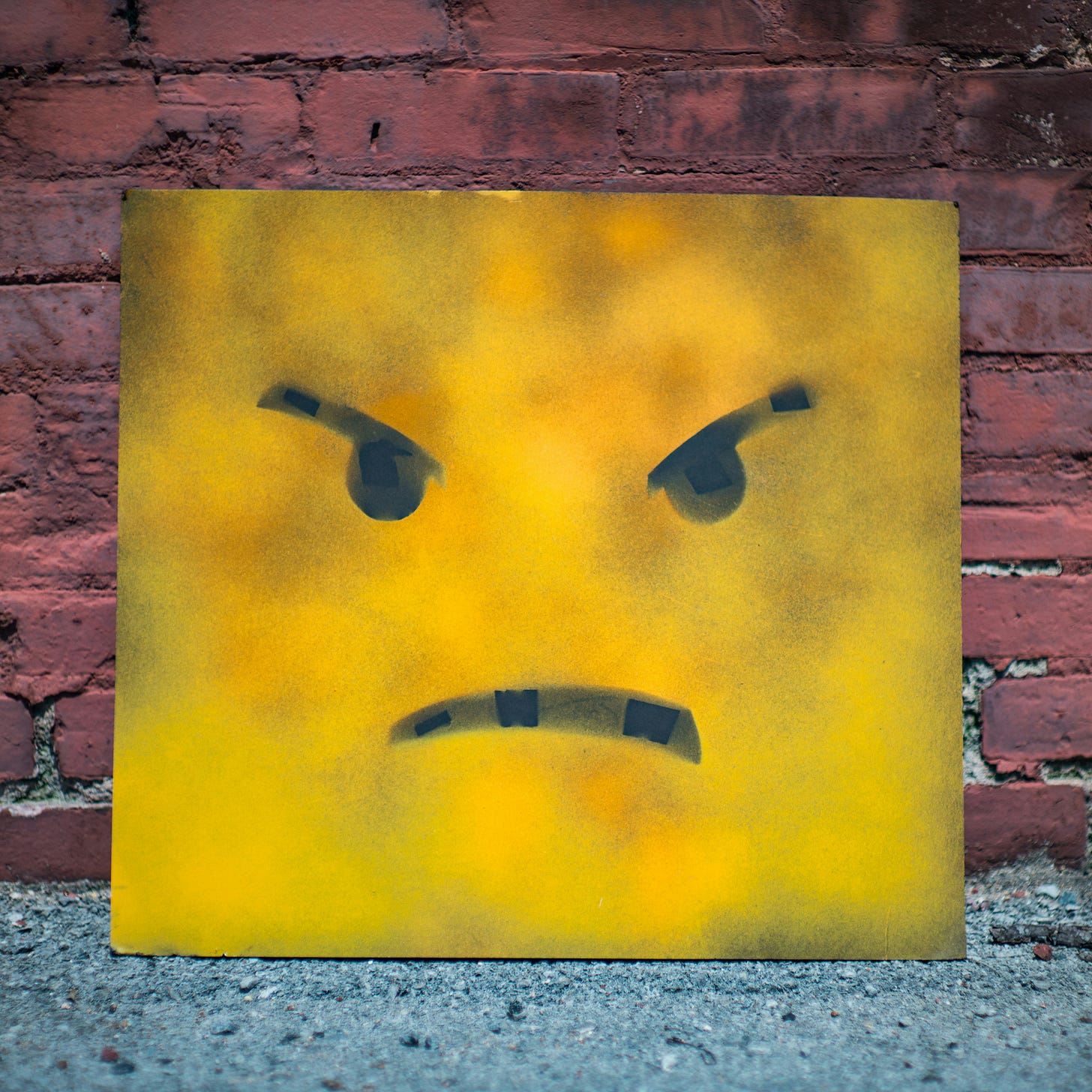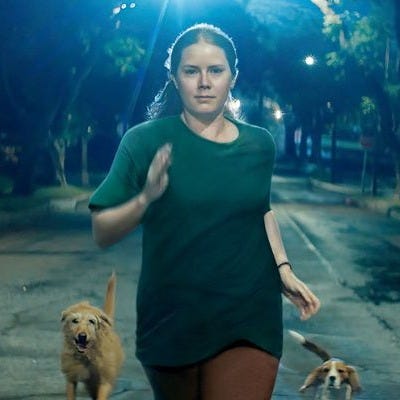Resolving to Rage
On New Years, Nightbitch, and the Trouble with Daycare Tropes and Self-Help Takes on Marriage and Motherhood
I’m not big on resolutions. As a sociologist, I’m skeptical of the idea that we can simply will our way to better lives. That said, I am trying to approach this new year with a willingness to embrace rage. Anger can give us the courage to fight for justice. And it’s pretty clear that we need that courage right now.
Fittingly, then, I started the year with Nightbitch, a new film starring Amy Adams. My husband and I watched it together over two nights, since, after the putting kids to bed, I rarely have the energy to finish a movie without falling asleep on the couch. I’ve been a mom for more than a decade now, but the movie brought me instantly back to the anguish of the early days while touching on aspects of family life that I still struggle with ten-plus years on.
For context: my first year of motherhood almost broke me. Because of long waitlists and bad timing, my daughter wasn’t able to start full-time childcare until after she turned a year old. In the meantime, my husband had just started a new job and was only able to take two weeks of leave. And we didn’t have any family living nearby. So, after the first two weeks, it was mostly on me. I had a semester off from teaching, but I was also running up against a ticking tenure clock, with pressure to finish my first book and prep a new class. I eventually found a college student to babysit for eight hours a week while I was teaching. But the rest of my paid work had to get done during naptime. And my daughter was born tiny, with digestive issues that made sleep fleeting for both of us—for most of her first year, she would only nap if I held her upright. On top of that, we were trying to sell our house to move closer to work, so I had to keep everything showing-ready all the time.
That first year of motherhood made clear to me how easily exhaustion can tip into rage. One night—I don’t remember what set me off, just that I was so tired I could barely stand upright—I ended up slamming my bathroom door in frustration and catching my fingers between the door and the jamb. Ironically, I never got to sleep that night. I couldn’t relax with the pulsing pain of blood building up under my smashed fingernails, two of which turned blue-black and eventually fell off.
Nightbitch doesn’t shy away from that kind of anger—or from that kind of visceral, gory detail. Yes, this movie is gross, but so is motherhood. There is weird stuff happening to bodies. There is dirt, blood, pus, sweat, and poop. (Honestly, I was surprised there wasn’t more poop in the movie, since we’re dealing with childbirth, toddlers, cats, and dogs). If we had smell-o-vision, the stench of this movie would have made me gag.
I appreciated that Nightbitch was willing to go there. There being the filth of motherhood. And there being the place where we acknowledge that it’s possible to be a good mom while also hating aspects of motherhood (particularly motherhood as it exists in a society where the lack of a decent social safety net leaves women to do the bulk of the work of care). The real message of Nightbitch, in my view, is that finding ways of expressing that anger can actually make women better mothers. Because that way, the rage doesn’t consume them, and because anger can lead to solidarity with other moms.
<<WARNING: SPOILERS AHEAD>>
One thing I didn’t love about the movie was its dismissal of childcare. There’s a conversation between the main character and her husband, neither of whom are even given names—they’re just billed as “Mother” and “Husband.” Mother (Amy Adams) is seething at Husband (Scoot McNairy), who has just returned home from a business trip. She tells him “I’m the housewife I never wanted to be,” adding that “the hardest part is that, like, I’m always on suicide watch. Like, if I turn my head for just a second, he’s gonna stick a fork into a light socket or he’s gonna walk off a cliff.” A decent partner would offer some empathy, but, instead, Husband responds with: “It’s better than leaving him with those awful ladies at that awful daycare.” To which Mother concedes: “Oh, that was heartbreaking.”
I get why this conversation is included in the movie—plot-wise, it offers an easy explanation for why Mother is a stay-at-home mom, despite being so miserable in that role, and despite seemingly having the resources to pay for care. At the same time, I wish the movie didn’t lean so quickly or so unquestioningly into such tired and troubling tropes. As I detail in Holding It Together, the US has a long history of fear-mongering around childcare, and those scare tactics have played a big role in guilting mothers (especially White mothers) into staying home.
While critiquing childcare centers, Nighbitch also valorizes nannies. One of Mother’s former colleagues, Naya, is also a mom. Yet, she’s still a successful working artist—even getting her grant applications in on time—because she has a nanny she loves. At a dinner party, Mother asks Naya, “Is it ever hard to balance it all, like, motherhood and art?” To which Naya shrugs and says, “Not really,” adding: “I couldn’t do it without Christie. Thank God for my nanny. But I guess I’m a better mom because of my work. And I just, I haven’t lost myself, you know?” The subtle implication here is that nannies are good and loving, while “those awful ladies at that awful daycare” are not. Which suggests, in turn, that the only way for moms to avoid “losing” themselves without sacrificing their kids’ wellbeing is to pay $60,000 or more per year for care.
For related reasons, I didn’t like how Nightbitch yada-yada-ed the ending. In the last few minutes of the movie, we see Mother and Husband nestled lovingly together and reading a book with their son in a blanket fort that looks both sturdier and more elegant than anything my kids and I have ever managed to build. Yet, it’s not clear how the couple got there from their moment of reckoning at Mother’s gallery opening. Which leaves the viewer to assume that the way to solve a deeply unequal and rage-ridden marriage is for Mother to just leave Husband alone for a few weekends with the kid.
That kind of trial-by-fire might be enough to snap some men into being better dads and partners. But as I show in Holding It Together, simply telling men to step up rarely solves the deeper structural problems that keep couples stuck in place. So, if Mother and Husband are actually happy now, it’s likely because Mother hired a nanny like Naya’s or entrusted her son to “those awful ladies at that awful daycare” after all.
To that end, I’d say that Nightbitch falls into the trap that too often plagues self-help books on marriage and motherhood. It treats gender inequality as a problem that can be solved at an individual level, and it treats the problem as women’s responsibility to solve. I get the appeal of an individual solution—it’s empowering to believe that you can fix a problem all on your own, and it’s also reassuring if life has taught you that you can’t rely on anyone else. The reality, though, is that self-help solutions can’t fix structural problems. Sure, they might work for some people (usually the most privileged), but they leave anyone who’s left struggling with only themselves to blame.
If women are so riddled with internalized rage that they risk turning into cat-slaughtering dogs when the sun goes down, it’s not because they’ve failed to fully and faithfully follow some five-step plan. It’s because they live in a DIY society where men are incentivized to push the unpaid and underpaid work of care onto the women around them, and where women with privilege are incentivized to push that same work onto others who are more vulnerable than them. Under that incentive structure, it can seem “rational” for a husband not to notice the dirty dishes in the sink, the diaper that needs changing, or the email about the field trip, just as it can seem “rational” for a mother to find someone (usually a low-income woman of color) that she can underpay to do at least some of the housework and the childcare.
I was glad to see Nightbitch at least hint at awareness of these deeper structural problems. A few times in the movie, Mother imagines laying into others whose comments fuel the guilt she’s already feeling. But each time, she muzzles herself—opting for a polite reply instead. There’s an early scene, for example, where Mother is at the grocery store with her son and runs into Sally, a former coworker, who asks her “Do you just love getting to be home with him all the time? Must be so wonderful.” At first, we see Mother snap at Sally, saying, “I would love to feel content, but instead, I feel like I’m just stuck inside of a prison of my own creation where I torment myself until I’m left binge eating Fig Newtons at midnight to keep from crying. And I feel like societal norms, and gender expectations, and just plain old biology have forced me to become this person that I don’t recognize, and I’m just angry all the time. Like, all the time. And you know, I would love to direct some of my own artwork towards a critique of the modern day systems that articulate this, but my brain just doesn’t function the way it did before I had the baby, and I’m dumb now, and I am deeply afraid that I am never going to be smart, or happy, or thin ever again.” But then, we flash back to Sally’s original question, and we see that what Mother really decides to say is “Oh yeah, I do. I love it. I do. I love being a mom.”
The movie also left me with a couple of niggling logic questions, though none were big enough to ruin the film. Why, for example, do the other nightbitches keep showing up during the day in dog form? Where are their kids while they’re running around at the park, dropping hints with their strawberry shampoo? My guess is that the source book, by Rachel Yoder, delves into these world-building details that the movie glosses over for time. And for that reason, I’ve already added it to my to-be-read queue for 2025.
Along those lines, if you’ve already read Nightbitch and you’re looking for your next mommy-horror (or at least horror-esque) fix, I’d recommend The Violence by Delilah S. Dawson and Our Missing Hearts by Celeste Ng. Like Nightbitch, they offer vivid and even gory portraits of motherhood, and they both explore with keen sociological imaginations, the power that women can wield when they embrace their rage. ●





